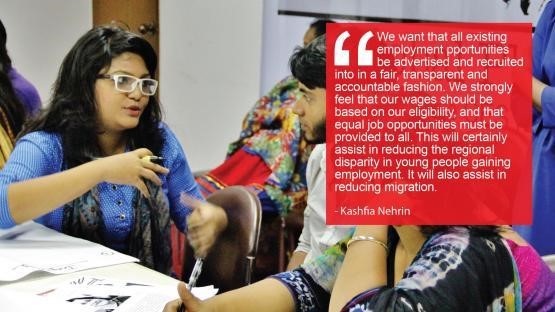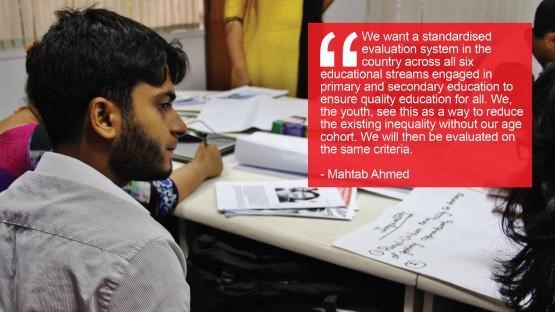

Starting in 2012, young people in Bangladesh joined the millions of young people across the world to participate in surveys and dialogues amongst themselves but also with decision makers to highlighting their priorities.
As seen through the different perception surveys through the MyWorld Survey, young people in Bangladesh, aged 16-30 years, rated quality education, increased employment opportunities, honest and responsive government, equality between women and men, healthcare and reduction in violence as ‘very high’ in their list of priorities.
Next Generation Bangladesh: 2015 and Beyond (September 2015) jointly commissioned by ActionAid Bangladesh, British Council and University of Liberal Arts Bangladesh took forward these priorities highlighted by young people to solicit further youth perceptions on their current engagement and areas that need to be strengthened through stakeholder commitment.
As world leaders are meeting in New York to approve the Post 2015 Goals, ActionAid Bangladesh together with Activista Bangladesh and Global Platform Bangladesh held a discussion to develop key messages focused on inequality (watch out for #inequality) and employment.
Working with their fellow young activists, they addressed issues of inequality related to quality education at the primary and secondary levels, accessibility and availability of healthcare centers outside of key cities, supporting skills development (especially soft skills) and civic engagement as a mechanism to support their transition to the labour market.
Our young partners focused on the need to increase youth participation in the decision making processes at the local level. They are keen to see an increase of youth representatives amongst the parliamentarians especially noting that less than 1% of parliamentarians globally are below the age of 30. Key dialogues and increase of youth participation at the Thana, Union and/or Upazila level administration was reflected as a mechanism to ensure that they would be able to access information and contribute to change in their community.
Our young partners mentioned that providing opportunities for small business (accessing financial services, especially) would mean that young people do not feel forced to migrate. This would in turn enable youth creating big impact in the rural sector of the country. Development will no more be centered on the capital or other major cities, rather decentralised. They also mentioned improved public service provision targeting adolescents.
Over 88% of young people believe the country will be prosperous over the next 15 years. They are keen to be engaged in implementing the next development goals and targets – especially the ones related to health, climate change and employment.
Now would be the moment to seize this energy and bring young people to the table (#YouthDiscuss) so that they can contribute to the design and the implementation of the goals in the country.